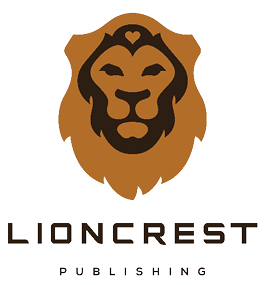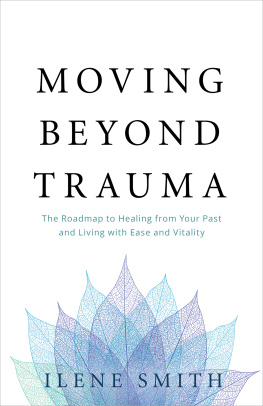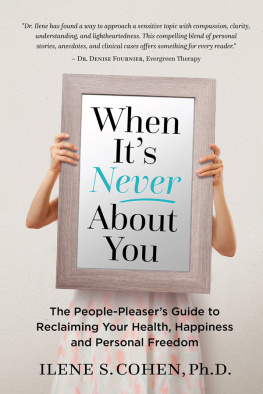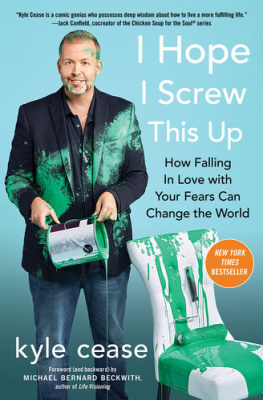Ilene Smith - Moving Beyond Trauma
Here you can read online Ilene Smith - Moving Beyond Trauma full text of the book (entire story) in english for free. Download pdf and epub, get meaning, cover and reviews about this ebook. year: 2020, publisher: BookBaby, genre: Religion. Description of the work, (preface) as well as reviews are available. Best literature library LitArk.com created for fans of good reading and offers a wide selection of genres:
Romance novel
Science fiction
Adventure
Detective
Science
History
Home and family
Prose
Art
Politics
Computer
Non-fiction
Religion
Business
Children
Humor
Choose a favorite category and find really read worthwhile books. Enjoy immersion in the world of imagination, feel the emotions of the characters or learn something new for yourself, make an fascinating discovery.
- Book:Moving Beyond Trauma
- Author:
- Publisher:BookBaby
- Genre:
- Year:2020
- Rating:4 / 5
- Favourites:Add to favourites
- Your mark:
- 80
- 1
- 2
- 3
- 4
- 5
Moving Beyond Trauma: summary, description and annotation
We offer to read an annotation, description, summary or preface (depends on what the author of the book "Moving Beyond Trauma" wrote himself). If you haven't found the necessary information about the book — write in the comments, we will try to find it.
Moving Beyond Trauma — read online for free the complete book (whole text) full work
Below is the text of the book, divided by pages. System saving the place of the last page read, allows you to conveniently read the book "Moving Beyond Trauma" online for free, without having to search again every time where you left off. Put a bookmark, and you can go to the page where you finished reading at any time.
Font size:
Interval:
Bookmark:


Copyright 2019 Ilene Smith
All rights reserved.
ISBN: 978-1-5445-0600-5
This book is dedicated to my mentor Mia Elwood, and Healthy Futures AZ for the guidance and encouragement to take a deep dive into Somatic Experiencing and for giving me a home to practice my skills.
Some parts of this book have been altered in varying degrees, for various purposes. This book is not intended as a substitute for medical or psychological advice from professionals.
On some level, albeit often a subconscious one, people realize that their bodies and minds are intricately connected. Look no further than yoga or Pilates. Often, people begin these practices based on the physical results they want to achieve. But if they stick with them for long enough, something starts to change. You will often hear practitioners talk about how the physical movement alleviates stress or eases their mind. This is not a coincidence. Its the mind - body connection at work. What these people are actually experiencing is the dawning understanding that we dont handle stress in our heads, for as much as Western society treats stress as a cognitive issue. In truth, healing and balance require bringing the body into the process.
Psychological stress is held and manifests in our physical body. Its important to understand this, because in this day and age the vast majority of us are experiencing increasing levels of stress as the world becomes a little bit faster every single day. As more mental health issues crop up, people are beginning to understand that the things were currently doing, including different types of talk therapy, dont offer the complete solution. Even insurance companies are starting to acknowledge this by contributing to alternative therapies and preventative care.
Since you picked up this book, you may very well be in the same position that so many of my clients find themselves in: youve tried all of the traditional routes to resolve psychological stress and trauma, yet you are still in the thick of it. Perhaps youve tried therapy or even medication and you still feel anxious or dysregulated. Maybe you feel like your body and brain are moving in different directions. If so, youre not alone.
We are told that psychological issues are resolved in our headthat its a cognitive process. As a Somatic Experience therapist, I couldnt disagree more. Have you ever heard the phrase We hold our issues in our tissues? Its something like that. To feel less stress, more connection, more joy, and more healed, we have to bring our bodies into the equation. Thats where the answers lie, and that is the missing link.
Most people go to talk therapy because they want their life to feel different somehow. They want to feel more comfortable, more connected to the people and world around them and to themselves. They want to feel safer.
Through the process of talk therapy, we dig around and try to understand why the things in our lives are the way they are; why we are the way we are. We seek answers for why we act the way we do, why certain things are so difficult, and why we cant achieve the things in life we want to achieve, such as healthy, loving relationships, a sense of autonomy, or a feeling of fulfillment. We go to talk therapy because were curious about ourselves and want to make a change for the better. We want answers.
All of this is very well intentioned. After all, its what were told to do when we want to improve our lives and ourselves. Dont get me wrong: I do believe that talk therapy certainly offers some benefits. However, here is the issue: in the process of digging around for answers, most therapeutic processes end up dredging up our past experiences. And when we talk through those experiences without also dealing with them in an embodied way, talk therapy can actually be counterproductive. We can end up re - traumatizing ourselves rather than healing. Instead of healing, we move into more discomfortor, at least, our level of discomfort does not diminish. As human beings, our natural instinct is to move away from pain, so very few people actually dive into and resolve the pain that can be brought up in the course of talk therapy.
We cant trick our bodies into thinking weve dealt with pain and trauma simply by talking through it. We might be able to fool our mind, but we cant fool our bodyand we especially cant fool our nervous system.
Processing and expunging the pain and trauma of past experience is like peeling back the layers of an onion. One of the things we must do in this process is to build up resilience. We need to build up a new sense of safety. Without doing these things, we have not resolved the issues we sought out therapy for in the first place.
There are certain things you can do along the way to help you build up a better sense of safety and connection. For example, I have many clients who have attended various types of healing workshops. For a lot of them, those workshops have been helpful insofar as they have helped create connection and a sense of safety. Both of these things are very important. But they still dont solve the problem on a root level. They just take care of one layer of it. In order to get to the root of our pain, hurt, and trauma and heal it once and for all, we have to bring our body and nervous system into the process. Its how we are built as human beings.
I also have to tell you that there is no quick fix for any of this. Healing is possible, but it takes time. However, I know plenty of people who have spent years and years in talk therapyI spent fifteen years in it myselfand never found true healing.
As a society, we have become accustomed to quick fixes and distractions. We can just turn to our phones and listen to a podcast or scroll mindlessly through social media until we have managed to blunt whatever emotion it is that we are trying to avoid. We can look at porn, we can shop, we can play gameswe have an enormous toolbox of distractions at our fingertips these days. More than ever before in the history of mankind, we dont have to sit with our emotions if we dont want to. Because, lets be honest, who really wants to sit with some of the more difficult human emotions like grief, anger, and sadness?
Despite our best intentions, talk therapy can be a distraction too. It distracts us from what were feeling. It keeps us focused on trying to solve the problem or level up, so to speak. What it doesnt do, though, is get to the heart of the issue at hand. It does not hold our hand so that we can safely move through whatever it is we are feeling and get to the other side.
I wanted to heal long before I actually did. In fact, I spent years and years trying to heal, but I now realize that despite all of my best efforts, I just didnt have the tools at my disposal to do so. Like so many people, I thought that talk therapy would provide me with all of the answers I needed to understand my pain and behavior and, thus, how to bring an end to both of them. I continued to believe this even after years of continuing talk therapy without any significant changes in my behavior or how I felt.
I want to be clear that its not that I didnt gain anything out of talk therapy; I did. I learned a lot about how I functioned as a human being. Talk therapy opened my eyes to the fact that I was afraid of setting boundaries, and avoided situations that made me uncomfortable. I tended to shift between over - attaching and detaching to the people in my life. In short, talk therapy gave me a framework through which I could recognize when things werent right or when I wasnt behaving in ways that worked toward my best interests. But it didnt help me break these habits or maladaptive behaviors. It just made me more aware of them.
Font size:
Interval:
Bookmark:
Similar books «Moving Beyond Trauma»
Look at similar books to Moving Beyond Trauma. We have selected literature similar in name and meaning in the hope of providing readers with more options to find new, interesting, not yet read works.
Discussion, reviews of the book Moving Beyond Trauma and just readers' own opinions. Leave your comments, write what you think about the work, its meaning or the main characters. Specify what exactly you liked and what you didn't like, and why you think so.









